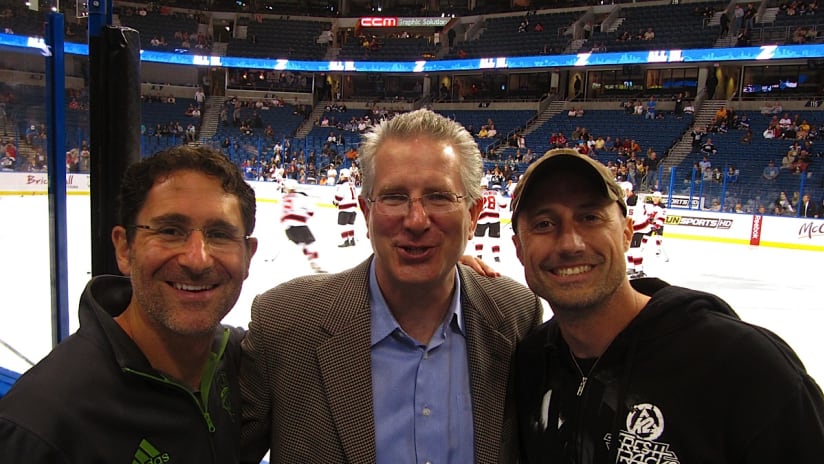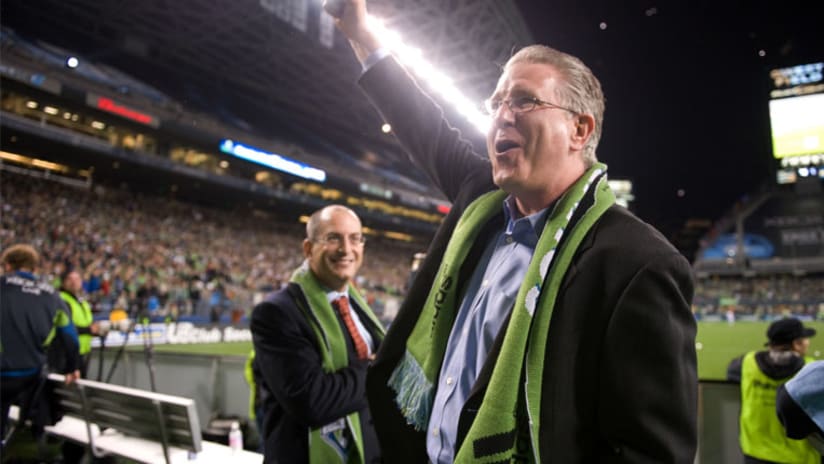MLSinSeattle.com Insider Frank MacDonalds sits down with Vulcan CEO Tod Leiweke in this edition of "10 Questions"
He played the game as a boy and cut his teeth on the six-a-side version of the game to start his career. Now Tod Leiweke has brought soccer into the fold of Paul Allen’s Vulcan Sports & Entertainment. As CEO, Leiweke oversees the business management of the MLS franchise, along with the Seahawks and Trail Blazers. Yet at heart he’s really a fan, and wherever he’s gone in the NBA, NHL or NFL, Leiweke has successfully created or revived powerfully positive relationships between the teams and their supporters.
Which sports were played by you or your brothers and what were the favorites?
We actually played a lot of sports: Football and hockey and soccer. My father was a huge football fan, but in growing up in Saint Louis everyone played soccer. Saint Louis prides itself as the home of amateur soccer in America, and certainly there’s a special tradition in soccer. Later in life, my two brothers helped start the St. Louis Steamers, which was an indoor team which had huge success in its early years. My first job in professional sports was with the Kansas City Comets, where I worked for my two older brothers.
It’s the holiday season and families tend to celebrate together. As you mentioned, you and your brothers share the common experience of professional sports management. In fact, your brother Tim oversees the organization which runs, among other things, the L.A. Galaxy. What about that relationship?
Tim’s not coming this year, so it won’t be as interesting. But it is kind of interesting that my brother’s involved (in MLS) and he had been encouraging us for a long period of time, and now he couldn’t be more proud. He sits atop a different kind of enterprise. I tease him and say my job would be a hobby to him. It is kind of neat because we know a lot of the same people and we can finish each other’s sentences We both have unique background in soccer. His has been in forming a league and mine will be in forming a team. We think we can be a leading team in the league he helped form.
Being a sports fan can be more complicated these days. But in essence, sports can be simple and command mass appeal. How do you tap into that?
Organizations like ours should be transparent. Really our job is to connect the players and the team with the fans. And in many ways it feels like we’ve done that with the Seahawks, and we are certainly going to do that with the soccer team.
When you first arrived, you first sat in the stands, up the nest and elsewhere, getting a feel for the fans and what they experience. Where does that come from?
If you want to relate to the fans, ultimately you have to be a fan. So every game I try to walk the stadium, try to get on all the levels. Out of that you can then accurately sit in judgment on how you’re performing and what the facilities feel like and how the fans are relating. Once the games begins. I stand on the field in the end zone. At the end of the day I like to think that I’m not an executive that sits in an ivory tower, that I’m someone who gets out and truly understands how the fans are feeling.
You have been in Seattle for four years now, and I’m sure you encountered your fair share of soccer fans who were undoubtedly anxious and impatient about the wait for an MLS team. Could it have happened any sooner?
People asked us for a long time, ‘When is it going to happen?’ I would often say, When we do it, we will do it right, so that it has a chance to succeed for the long haul. And now, when you look at this partnership between Joe Roth, Adrian Hanauer and Paul Allen, you can check the box that we put the right partnership together. Each one of those partners brings unique skills: Adrian’s knowledge of the game and winning championships; Joe Roth’s passion for the game and his belief in Seattle; and ultimately Paul Allen building the stadium, saving the Seahawks and fulfilling his pledge that he would bring soccer here. Paul (Allen), Joe and Adrian: that’s a pretty potent combination.
You’ve been a part of many different professional sports organizations. What truths transcend each sport when it comes to building a brand and attracting fans?
Understanding your fans, building a brand that’s reflective of the value of those fans and being diligent and executing that brand in a consistent and clear way. In my career I’ve been involved with golf, basketball, hockey, football and soccer, and the feeling is this MLS team is definitely different. This is not and will not be a cookie cutter approach. The way we’ll present the games, ranging from nomenclature to halftime shows, will be different. This is a different audience than the Seahawks audience and that’s where we really like our chances. When people come to our games, they’re going to be surprised how the stadium looks and it’s going to be an entirely different experience from a Seahawks game.
In managing those different organizations, have you ever started one from scratch?
I was president of Minnesota Wild, which was an (NHL) expansion team. We started a new team and built a new arena. Here, obviously we have our stadium in place, but the team will be new. No doubt in some ways it’s more challenging and in some ways you’re not encumbered by preexisting conditions. You’re able to get the pieces all to fit together in a comprehensive way and that’s our opportunity here.
What’s going to be the organization’s marketing approach?
We have more people in the state playing soccer, per capita, than any other state in the nation. Having said that, if our sole focus was youth soccer organizations, I think we miss it. From my experience in soccer, families tend to be busy; to say they’re overscheduled is not unfair. We’ve said this will be more than selling group tickets to youth soccer. We want this to be an experience for people of all walks of life and all soccer fans, ranging from the folks who go to the pubs to watch the great Champions League matches to youth soccer and everybody in between. Some teams have launched and focused almost exclusively on youth soccer. We’ve cast a wide net and I think we’ve got 10,000 deposits indicates a lot of different people from a lot of different sectors in this community have stepped forward to be a part of this.
What about the Qwest Field and the preparation for opening night 2009?
It was built with soccer in mind. The architects who designed Qwest Field were very specific about things they did to ensure excellent sightlines for soccer. For instance, where pitch meets stands and how the field is crested. Those were soccer-specific directions. Had it only been football, there would’ve been a different configuration. Those things were inherent. Now what we’re going to do, we take a 68,000-seat stadium–that feels very intimate to our football fans–and we’re going to endeavor to recreate that experience for the soccer fans. And we like our chances because Qwest Field is unique in its design. We’re going to focus on the lower bowl. We think the same environment we have for Seahawks Sundays can be created for the soccer team. There’s that intimacy and a feeling of being close to the playing surface, and the players’ feeling that the fans are on top of them and loud. We’re going to have some unique amenities that come with our facility: wide concourses, a spectacular Wells Fargo Club facility and then one of the great benefit in being urban is that we’re close to all the freeways and there’s ample parking.
As you said from the beginning, you and the ownership group believe in this market. But what’s been your reaction to the fans’ response thus far?
I thought we could build something here that was unique and special in the context of soccer. Did I think we would get to the number we’re at as quickly? No. Did I think we’d get to that number at the end of the day? Yes. Everyone is pleasantly surprised at the reaction. All it’s done is make us hungrier to get it right here. There’s a chance to do something really, really special, and we’re all realizing that. I’d say we’re working as hard as we can to get it right. Not a day goes by that we’re not engaged at some level. If we can continue to execute in the next 16 months we could have something special here.



